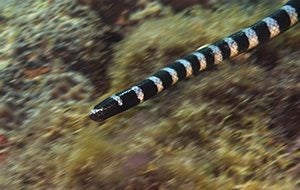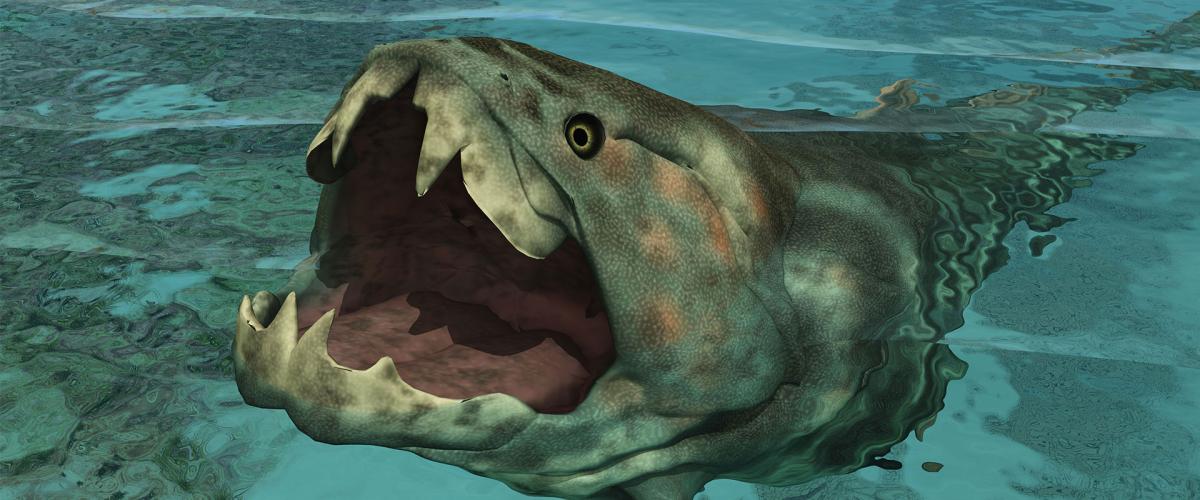Case Western Reserve University PhD student focuses on tropical islands
Snakes known to produce some of the most toxic venoms swim the shallows of the western Pacific and eastern Indian oceans and sun themselves on island coasts from southwestern Japan to Indonesia, the Andaman Islands to Fiji. But to find banded sea kraits, ask a guy in Cleveland. Or at least look up his work. Iulian Gherghel, who is earning a PhD in biology at Case Western Reserve University, teamed with researchers in Oklahoma and Europe to create a database of the snakes’ distribution. They published a description of their work and analyses in the current issue of the journal ZooKeys. The database is designed to help conservation efforts and guide medical researchers who want to study the venom of sea kraits, environmental researchers who want to study their ecology and tourists who want to see the animals, the authors said. “These snakes harbor potential for research in biomedicine,” Gherghel said. “The venom has proteins that may be useful in the future development of drugs for treating cancer, neurological disorders and heart disease.” Sea kraits, in the genus Laticauda, are closely related to cobras (found in Asia and Africa) and coral snakes (that can be found in the southern United States) and include seven species that feed almost exclusively on eels. Researchers believe that sea kraits’ powerful venom developed as a result of their specialized diet.
The brightly banded snakes occupy a narrow niche in the ecosystem, which makes them vulnerable to climate change and possible models to study the phenomenon and its affects, the researchers said. The reptiles hunt in ocean water and return to land to mate and lay eggs, bask in the sun and drink fresh water.
“Without measures to protect them and their habitat, they are likely to be highly affected by global warming,” Gherghel said. “That may destroy the opportunity to discover new drugs as well as the opportunity to enjoy these animals in the wild—at a distance.”
Although kraits are considered docile and are known to shy away from humans, their venom remains a good reason to view them from afar, he explained.
Gherghel; Monica Papes, of Oklahoma State University; Francoise Brischoux, of Centre d’Etudes Biologiques de Chizé; Tiberiu Sahlean, of the University of Bucharest; and Aleandru Strugariu, of the University of Iasi; compiled information on kraits from museum records, field surveys and scientific studies.
They included 694 occurrence records, almost all of them sightings in the coastal waters, which were mapped to the finest scale possible.
The banded sea krait, L. colubrina, was the most common, sighted in 448 unique locations and found over the greatest range. The flat-tail sea krait, L. schistorhynchus, was the least common, found in only six records and over the smallest range.
Sea snakes may be seen at popular tourist destinations such as the Fiji Islands, Vanuatu, Philippines, Indonesia and other archipelagoes from the shores of south-eastern Asia.
The database is free and open to the public, published as supplementary material with the research paper, which is available online.
Sea kraits, in the genus Laticauda, are closely related to cobras (found in Asia and Africa) and coral snakes (that can be found in the southern United States) and include seven species that feed almost exclusively on eels. Researchers believe that sea kraits’ powerful venom developed as a result of their specialized diet.
The brightly banded snakes occupy a narrow niche in the ecosystem, which makes them vulnerable to climate change and possible models to study the phenomenon and its affects, the researchers said. The reptiles hunt in ocean water and return to land to mate and lay eggs, bask in the sun and drink fresh water.
“Without measures to protect them and their habitat, they are likely to be highly affected by global warming,” Gherghel said. “That may destroy the opportunity to discover new drugs as well as the opportunity to enjoy these animals in the wild—at a distance.”
Although kraits are considered docile and are known to shy away from humans, their venom remains a good reason to view them from afar, he explained.
Gherghel; Monica Papes, of Oklahoma State University; Francoise Brischoux, of Centre d’Etudes Biologiques de Chizé; Tiberiu Sahlean, of the University of Bucharest; and Aleandru Strugariu, of the University of Iasi; compiled information on kraits from museum records, field surveys and scientific studies.
They included 694 occurrence records, almost all of them sightings in the coastal waters, which were mapped to the finest scale possible.
The banded sea krait, L. colubrina, was the most common, sighted in 448 unique locations and found over the greatest range. The flat-tail sea krait, L. schistorhynchus, was the least common, found in only six records and over the smallest range.
Sea snakes may be seen at popular tourist destinations such as the Fiji Islands, Vanuatu, Philippines, Indonesia and other archipelagoes from the shores of south-eastern Asia.
The database is free and open to the public, published as supplementary material with the research paper, which is available online.


